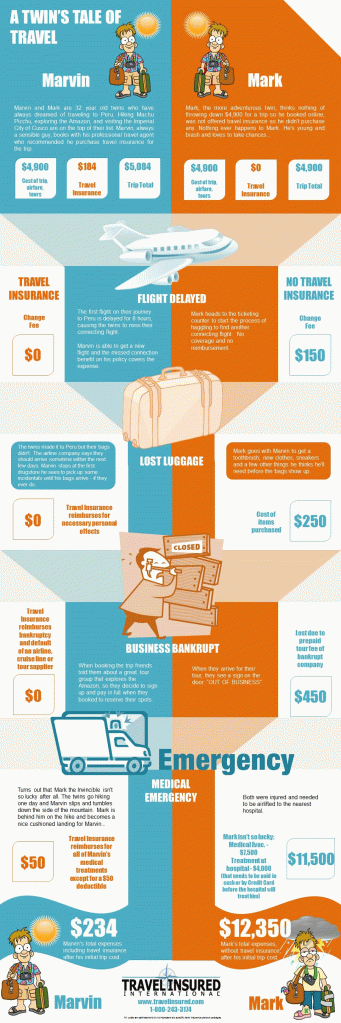A couple of years ago I booked a couple on a summer trip to Italy. On the day of departure, their outbound flight was canceled. They were promptly booked on the next day’s flight at no additional charge; however, they lost an entire day of their vacation. The hotel was non-refundable as was the excursion they missed on day two. Fortunately, they purchased travel insurance when they booked their trip and we were able to file a claim to recover the costs of the missed hotel night and the excursion. Without it, they would not have been so lucky.
I like to tell this story because it illustrates the value of travel insurance. For many, the assumption is that travel insurance is just extended medical coverage, and for healthy travelers this would seem redundant to their current plan. Travel insurance, in reality, has very little to do with medical coverage (although most good policies include emergency medical services) and is really a catch all to cover most events that could go wrong during a vacation. A sample policy that I might offer to my clients usually consists of the following:
– Trip Cancellation up to 100% of insured cost;
– Trip Interruption up to 150% of insured cost;
– Trip Delay up to $1000;
– Lost or delayed baggage up to $1000;
– Pet care boarding if you are delayed from returning home for medical reasons up to $300;
– Emergency Medical Expenses up to $50,000;
– Emergency Medical Evacuation or Repatriation up to $500,000;
– Travel Accident Dismemberment or Death up to $10,000; and
– 24-Hr Worldwide Emergency Assistance
Some clients think that their medical coverage provides out-of-network care overseas, but that is usually limited to bigger cities. In the middle of a crisis, the ambulance will likely take you to the closest emergency room which may or may not be affiliated with your home medical coverage.
And even if by some lucky miracle the ER is affiliated with your home medical coverage, I can guarantee with absolute certainty that any emergency medical evacuation costs are NOT covered. A medical evac or repatriation can cost upwards of $300,000. When a plan – such as the one above – might cost an extra $180 it’s hard to think of a reason NOT to have the coverage on hand just in case.
It’s also very important to really understand what the basic coverage includes and doesn’t include. Trip cancellation, for example, is usually limited to very specific circumstances such as (but not limited to): disabling sickness or injury of the traveling party; financial default of an airline, cruise line or tour operator; inclement weather; and the destination being devastated by flood, fire, volcano, or tornado.
Travel insurance also comes with optional coverage which I may recommend to clients depending on the nature of their trip. Such optional coverages include:
– Cancel for ANY reason;
– Sports coverage;
– Renters Collision Insurance; and
– Increased limits to Medical and Baggage Coverage
Again, it’s important to know the limits of the coverage especially as it pertains to sports. The coverage was designed for “low-risk” activities like skiing or even skydiving (in some cases), and may not cover accidents or injuries caused by other sports such as jet skiing or rapelling. Even more so, if you were negligent or reckless in a covered sport, your claim for accident or injury will be denied.
I don’t go on any trip without travel insurance. With more and more flights being delayed and cancelled, I want to know that I’ll be taken care of since the airlines no longer compensate you for anything less than a mechanical failure. I’m also rather accident and sick-prone, and if I were to ever come down with a sudden case of malaria or fall and break my ankle, I never have to think twice about seeking medical assistance.
There are a number of great providers out there that offer quality plans in terms of coverages, limits, and premium price. My personal preference is Travel Guard and Travel Insured. (Travel insurance policies offered by airlines and cruise lines offer very different exclusions and waivers and it’s extremely critical that you understand what those are if you are considering purchasing through those carriers.) Both Travel Guard and Travel Insured offer a variety of plans to best suit the nature of your trip. A basic worldwide plan, with optional cancel for any reason, costs on average about $250. For an 8-day trip to Italy that costs about $5,500, that works out to about $30 a day.
At the top of this page, I’ve included a link to Travel Guard if you’re interested in seeing what a plan may cost for your upcoming vacation. I encourage you to check it out and to bookmark this page to return to when you’re ready to purchase your travel insurance policy!
And now I’ll leave you with this great infographic which compares Marvin and Mark’s vacation and how travel insurance can really pay off in just a few unfortunate, but very realistic, scenarios:
Have you ever purchased travel insurance?
Now that you’ve learned more about it, will you in the future?


